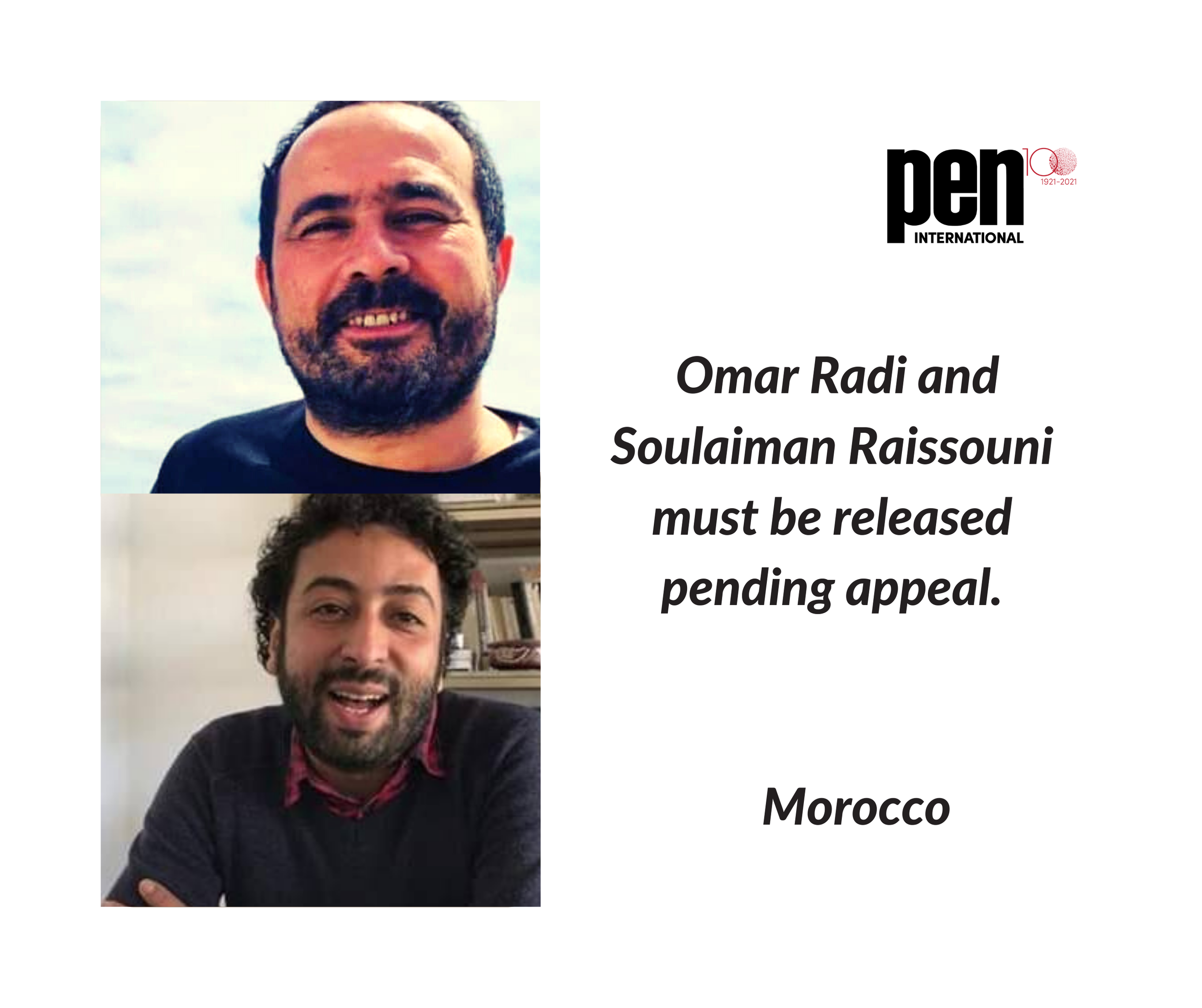Morocco: journalists Omar Radi and Soulaiman Raissouni must be released pending appeal
Journalists Omar Radi And Soulaiman Raissouni
PEN International calls for the release of prominent Moroccan journalists, Soulaiman Raissouni and Omar Radi, pending the outcome of their appeals. Raissouni’s appeal is expected to begin on 13 October 2021, while the date for Radi’s has yet to be set. Both journalists were convicted in two separate cases in July 2021 and sentenced to five and six years’ imprisonment, respectively, following grossly unfair trials. PEN International urges the Moroccan authorities to guarantee fair trials and their physical well-being pending release.
“Independent voices should not be imprisoned, targeted by smear campaigns, subjected to unfair trials or intimidated for practising their right to freedom of expression. Moroccan authorities must immediately release journalists Soulaiman Raissouni and Omar Radi, ensure fair judicial proceedings, and end its crackdown on freedom of expression in the country,” said Ma Thida, Chair of PEN International’s Writers in Prison Committee.
Soulaiman Raissouni is a prominent Moroccan journalist and editor-in-chief of the now-closed opposition newspaper Akhbar al-Youm, known for his editorials critical of the Moroccan authorities. On 22 May 2020, Moroccan police arrested him on charges of ‘sexual assault’ and ‘enforced confinement’. Raissouni denied the allegations, denouncing them as retaliatory and politically motivated in a bid to intimidate him. Local human rights groups condemned his arrest as arbitrary, citing the circumstances of his arrest, the smear campaigns by pro-government media, and the lack of evidence against him. International human rights organisations further highlighted the Moroccan authorities’ pattern of intimidation of dissenting voices through the use of sexual assault charges.
Raissouni remained in awful pre-trial detention for months before the Casablanca Court of Appeal sentenced him on 9 July 2021 to five years imprisonment and 100,000 Moroccan Dirhams (8,100£). The trial was marred by irregularities, with the sentence handed in the absence of Raissouni and his defence team.
Raissouni’s family told PEN International that the Moroccan authorities prevented him from attending several trial hearings, including the sentencing session, and all his requests for release pending trial were rejected. Moreover, his family confirmed that while in detention he was prevented from seeing his family and has been denied his right to legal counsel on several occasions.
Omar Radi
Leading investigative journalist Omar Radi is known for his work on injustice, corruption, relations between political powers and business elites, human rights, and social movements. He has worked for several media outlets including, TelQuel, Media 24, and Le Desk.
On 29 July 2020, the National Brigade of Judicial Police (BNPJ) summoned Radi for investigation over alleged accusations of ‘assault with violence and rape’, ‘undermining state security by receiving foreign funding’, and ‘collaborating with foreign intelligence’. The BNPJ referred him to the Casablanca Court of Appeal, where an investigative judge ordered his detention pending further investigation. He remained in pre-trial detention for over a year before a Casablanca court sentenced him to six years’ imprisonment on 19 July 2021, following a trial deemed unfair by leading human rights organisations, including Amnesty International.
Radi has been a target of the Moroccan authorities for years. According to HRW, in June 2020, Radi was summoned by the BNPJ and the Gendarmerie Royale Brigade in Casablanca for 12 interrogation sessions of six to nine hours each to face multiple accusations, including allegedly providing ‘espionage services’ to foreign governments, firms, and organisations. He was previously detained in 2019 over a tweet in which he criticised a judge who imposed heavy penalties on protesters from the Rif region. In June 2020, Amnesty International identified evidence suggesting that Radi had been targeted by the Moroccan authorities using the notorious Pegasus spyware produced by Israeli company NSO Group.
PEN International strongly believes that all allegations of sexual and gender-based violence should be taken extremely seriously, thoroughly investigated and perpetrators brought to justice. Furthermore, survivors of sexual and gender-based violence should be provided with all the support they need to recover from their ordeal including through testifying in court. PEN International stresses that charges relating to sexual or gender-based violence should never be used as a pretext to suppress freedom of expression and intimidate journalists who have the right to fair and impartial judicial proceedings.
For more information, please contact Mina Thabet, MENA Regional Coordinator, at PEN International, Koops Mill Mews, Unit A, 162-164 Abbey St, London, SE1 2AN, Tel.+ 44 (0) 20 7405 0338, email: [email protected]
Note to editors:
PEN International promotes literature and freedom of expression and is governed by the PEN Charter and the principles it embodies: unhampered transmission of thought within each nation and between all nations. Founded in London in 1921, PEN International – PEN’s Secretariat – connects an international community of writers. It is a forum where writers meet freely to discuss their work; it is also a voice speaking out for writers silenced in their own countries. Through Centres in over 100 countries, PEN operates on five continents. PEN International is a non-political organisation which holds Special Consultative Status at the UN and Associate Status at UNESCO. PEN International is a registered charity in England and Wales with registration number 1117088.

